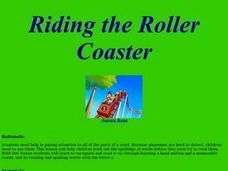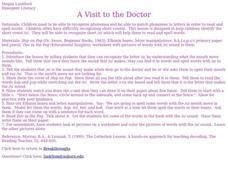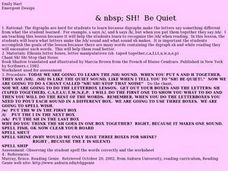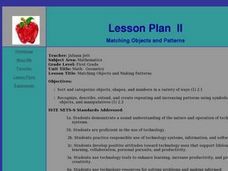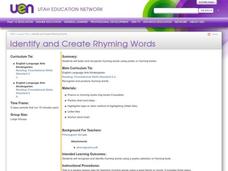Curated OER
Big Pig
Students study the/i/ sound and letter recognition using Elkonin letterboxes and letter manipulatives. They work with tongue twister that contains words with many examples of the /i/ sound. Next they buddy read "Liz is Six" before...
Curated OER
Vowels, Reading Fluency
Third graders practice identifying words with the short o vowel sound. They use the strategy will reading a page from The Hare and the Tortoise. They read the passage while focusing on increasing their reading fluency and practice...
Curated OER
Ashley's Apples
First graders compare the /a/ sound to that of a baby crying. They practice making the sound and then say the tongue twister as it is written on a sentence strip and then using the overhead and letters, name words with that sound in them.
Curated OER
Chips - Beginning to Read
Young scholars practice writing, sounding out, and spelling words with the /sh/ digraph. They listen as the teacher says words with the /sh/ digraph. They then use Elconin boxes and letter manipulatives to spell /sh/ digraph words. ...
Curated OER
The Crying Baby
Young scholars practice recognizing phonemes with letters emphasizing the /a/ in spoken words and by letter symbols. They interact with Elkonin boxes, letter manipulatives, the book, "A Cat Nap," and a poster with a tongue twister on it.
Curated OER
Adam's Apples
Students recognize the short vowel "A" in written and spoken language. Through matching and listening activities, they discriminate the short vowel /a/ from other vowel phonemes. Students associate the phoneme with its letter...
Curated OER
AAA!! The Baby is Crying! AAA!!
First graders take out primary writing paper and review how to form the letter "a". They observe a large picture of a baby crying on the board, discuss it and make the sound a baby makes when it is crying. They listen to some words,...
Curated OER
Riding the Roller Coaster
First graders recognize the short vowel a in written and spoken language. Through matching and listening activities, they discriminate the vowel sound /a/ from other phonemes. Students associate the phoneme with its letter representation...
Curated OER
A Visit to the Doctor
Students recognize the short vowel O in written and spoken language. Through matching activities, they discriminate the short vowel /o/ from other vowel sounds. Students associate the phoneme with its letter representation and identify...
Curated OER
Doc on Top
Students recognize the short /o/ sound in written and oral words in this lesson. They say a tongue twister which emphasizes words with the short /o/ sound. They then listen to the story "The Big Top" and identify the words in the story...
Curated OER
Sh! Be Quiet
Students practice writing, sounding out, and listening for words with the /sh/ digraph. Students participate in a chant Sh! Sh! Stop that Noise. Then they listen to "Book Shadow" and identify the words with the /sh/ digraph.
Curated OER
Y is for Yarn
Students practice saying the sounds of the letter Y. They create a poster of the letter made out of yarn. They identify the shape and identify other words that start with Y.
Curated OER
Exciting E's "/e/...what did you say?" Exicing E's!
Students recognize the short /e/ sound in spoken and written words. They say a tongue twister which emphasizes words with the short /e/ sound. They then listen to the story "Red Gets Fed" and identify the words in the story with the...
Curated OER
Olly at the Doctor
Students recognize the short vowel "O" in written and spoken language. Through matching activities, they discriminate the short vowel /o/ from other vowel sounds. Students associate the phoneme with its letter representation and identify...
Curated OER
Matching Objects and Patterns
First graders participate in hands-on activities and use objects to create patterns. They observe a PowerPoint lesson describing matching objects and patterns. In groups, 1st graders complete geometry computer activities such as planting...
Curated OER
Five Part Phonics: Blends
First graders participate in a variety of activities that feature the consonant blend 'st'. They read "Stan the Squid" and "Stella Started for the Station", answer comprehension questions for the stories, manipulate beginning sounds and...
Curated OER
Word Formation
In this word formation worksheet, students focus on six letters used for initial blending. Using these letters, students have the opportunity to make letter cards to move and manipulate the letters for beginning word formation.
Curated OER
Sneeze Cheese
Students study the /ch/ digraph by thinking of the sound that is made when someone sneezes. They listen to a tongue twister while identifying how many times they hear the /ch/ sounds and make words using the Elkonin boxes and letters....
Curated OER
Shaggy Sheba Shakes!
Students study the /sh/ digraph in order to determine that when the letters are together in a word they make one sound. They use letter boxes, letter manipulatives with the sh taped together, and poem, "My Shaggy Dog." Using the...
Curated OER
"Loud Cows All Around"
Students practice with vowel digraphs and how letters can correspond with phonemes. The activity consists of students learning the ou=/ow/ correspondence in which they will learn in both spoken and written words through reading and...
Curated OER
Aaron's Hair
Students listen to the story Aaron's Hair. They make predictions while listening to the story. They select where the /h/ sound is heard in the pictures that represent the word.
Curated OER
Carry Your Own Load Toad!
Students explore how to spell words with the vowel digraph /oa/. They read and spell words containing the oa digraph. Students read Toad Makes a Road. They clap their hands when they hear the /O/ sound in the story. Students practice...
Curated OER
Shh, Do Not Wake the Baby!
Students explore the /sh/ digraph and how it is a blending of the /s/ and /h/ sounds. They use letterbox manipulatives to spell 'sh' words and identify /sh/ words as they read a story. They 'fish' for 'sh' words to practice writing at...
Curated OER
Identify and Create Rhyming Words
Students discuss rhyming word families and read stories that present those families in rhyme. They generate rhyming words, manipulate sentence strips to pair rhymes and sort pictures of rhyming words.









